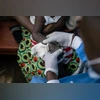All states and Union Territories (UT) have been told to review public health preparedness, along with screening and testing of all suspected cases of Monkeypox (Mpox), the government said on Monday, while asserting that it was closely monitoring the evolving situation.
India on Sunday reported a suspected case of Mpox.
In a letter issued on September 9, Union Health Secretary Apurva Chandra asked all the state governments and UT administrations to follow surveillance strategies laid down by the National Centre for Disease Control (NCDC).
Chandra also asked the states and UT officials to engage with key stakeholders, especially healthcare workers deployed in skin and sexually-transmitted disease clinics. State AIDS control societies too have been told to be on alert to pick up suspected cases and improve community awareness as around half the cases are reported to be in persons with HIV.
The health officials have been asked to undertake orientation with all key stakeholders, with special attention to healthcare workers working in skin and sexually-transmitted disease (STD’s) clinics to understand about common signs and symptoms in Mpox, along with differential diagnosis and actions to be undertaken following detection of a case.
The latest World Health Organisation (WHO) update on Mpox suggests that around half (51.9 per cent) of Mpox cases are reported to be in persons living with HIV.
More From This Section
The advisory directed senior officials at state and district level to review preparedness at health facilities.
The ministry also directed increased screening and identification of isolation facilities in hospitals for taking care of both suspected and confirmed cases, availability of required logistics and trained human resources in such facilities and augmentation plan.
The letter highlighted the need to strengthen disease surveillance units at state and district levels under the Integrated Disease Surveillance Programme (IDSP) for effective contact tracing and other surveillance activities.
Stating latest updates from the WHO, the health ministry also said that most cases reported from around the world are young males with a median age of 34 years (range 18 - 44 years).
“Among modes of transmission reported globally, sexual contact is the most commonly reported, followed by person-to- person non-sexual contact, with the most common symptom being rash (including systemic or genital rash), followed by fever,” it added.
The health ministry said that it continues to closely monitor the evolving situation, even as no new case of Mpox has been reported in India and none of the samples in suspected cases tested at National Institute of Virology (NIV) Pune have tested positive.
The central and state governments had sprung into action after the WHO designated Mpox as a public health emergency of international concern (PHEIC), following a surge in cases in African countries last month.
)